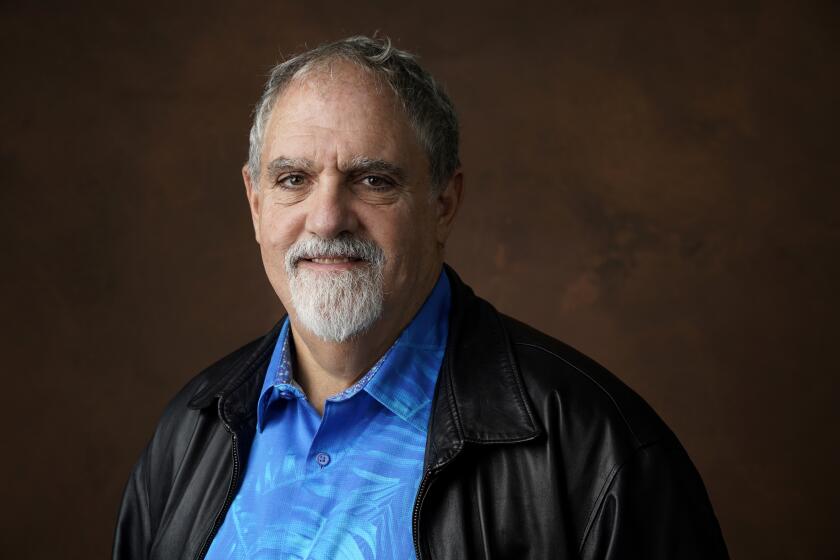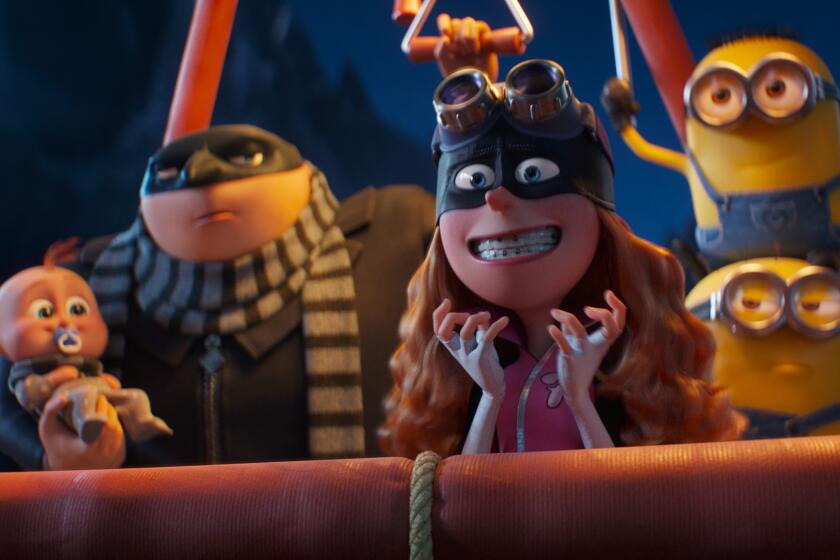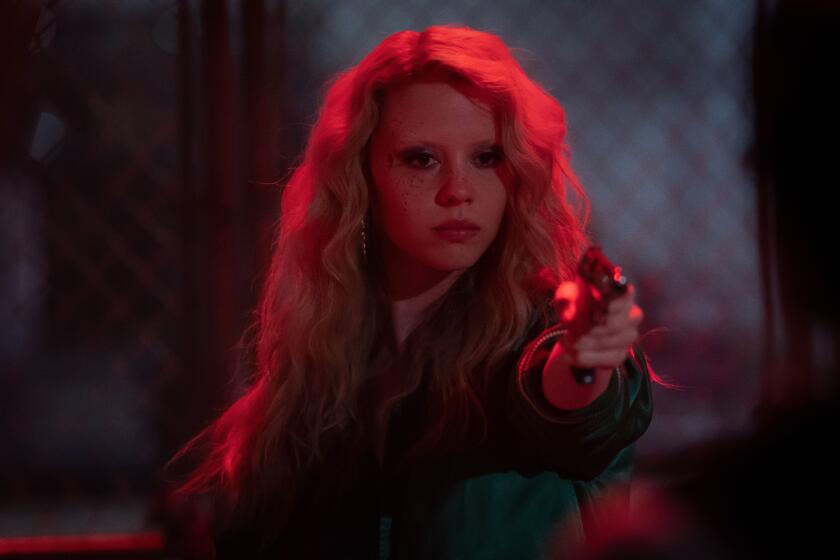‘Doctor Strange in the Multiverse of Madness’ is Marvel’s first foray into horror
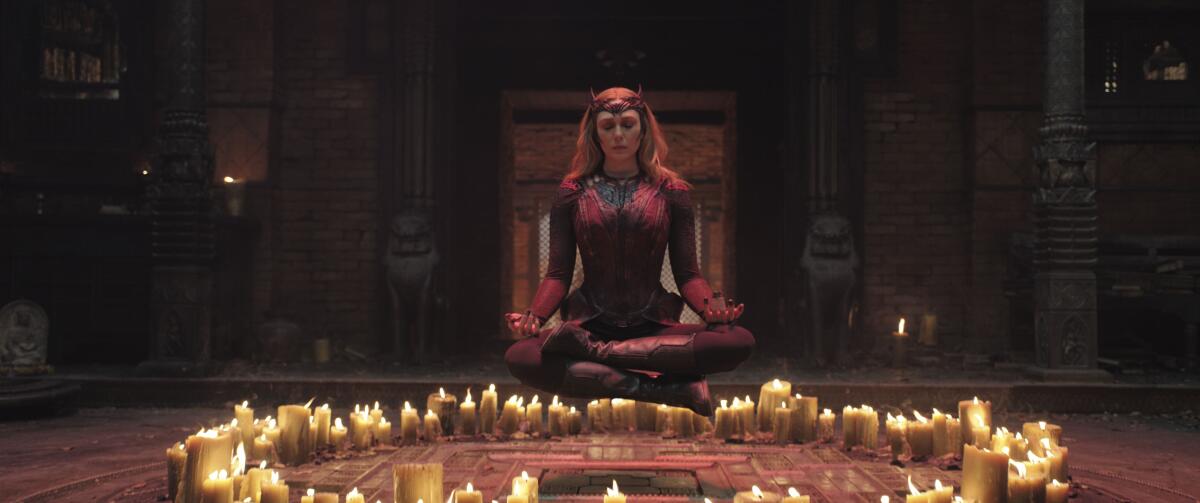
Hello! I’m Sonaiya Kelley, covering for Mark Olsen. Welcome to another edition of your reliable field guide to a world of Only Good Movies.
Only good movies
Get the Indie Focus newsletter, Mark Olsen's weekly guide to the world of cinema.
You may occasionally receive promotional content from the Los Angeles Times.
Fans go mad for “Doctor Strange.” Marvel’s hotly anticipated “Doctor Strange in the Multiverse of Madness” opens in wide release this weekend, expounding upon the multiversal themes first hinted at in the first post-”Endgame” feature, “Spider-Man: Far From Home,” and the Disney+ series “Loki” and taken to record-setting heights in the box office smash “Spider-Man: No Way Home.” The film lays heavy on the fan service, introducing new characters as well as familiar faces in unfamiliar roles. The film grossed an impressive $36 million in Thursday previews and is projected to clear more than $175 million before the weekend is over.
“Poetic Justice” at the academy. On Wednesday, May 11, the Academy Museum of Motion Pictures will screen John Singleton’s sophomore feature, “Poetic Justice” (1993), with the late director’s son, writer Justice Singleton, actor Roger Guenveur Smith and location manager Kokayi Ampah in recognition of the 30th anniversary of the Los Angeles uprising. Starring Janet Jackson and Tupac Shakur as Justice and Lucky, a beautician with a knack for poetry and the charming postal worker who courts her, the film is Singleton’s only movie with a female protagonist and was written specifically for Jackson. It’s also the rare studio film at the time to center around a Black woman.
“Fatal Attraction” and “Flashdance” double feature. On Friday, May 13, the American Cinematheque will host a double feature of Adrian Lyne’s ’80s classics “Fatal Attraction” (1987) and “Flashdance” (1983) followed by a virtual Q&A with Lyne moderated by Michael Mohan. The screening is part of the “E.T. The Erotic-Tuesday: You Must Remember This” series and will be held at Santa Monica’s Aero Theatre.
Enjoying this newsletter? Consider subscribing to the Los Angeles Times
Your support helps us deliver the news that matters most. Become a subscriber.
‘Doctor Strange in the Multiverse of Madness’
Sam Raimi’s first foray into the Marvel Cinematic Universe (not including the recently grandfathered-in “Spider-Man” movies he made for Sony in the early aughts), “Doctor Strange in the Multiverse of Madness” is essentially a sequel to the Disney+ series “WandaVision.” Benedict Cumberbatch and Elizabeth Olsen reprise their roles as Dr. Stephen Strange and Wanda Maximoff while new heroes like Xochitl Gomez’s America Chavez and several other surprise cameos are introduced. The film is in wide release nationwide.
For The Times, Justin Chang wrote, “If Scott Derrickson, the director of 2016’s ‘Doctor Strange,’ teased out the altered states and Far East mysticism in Steve Ditko and Stan Lee’s original comic books, then Raimi has found in this sequel a surprisingly accommodating vehicle for his ecstatic love of horror filmmaking (to say nothing of a darkly exultant score by Danny Elfman).”
For Vulture, Angelica Jade Bastién wrote, “In hiring a beloved ‘auteur’ like Raimi to take over the Doctor Strange sequel, Marvel has given the ‘Multiverse of Madness’ some heft. It has also piqued audience expectations for a familiar blend of pop art and macabre intrigue.”
For the Atlantic, David Sims wrote, “If you’re acquainted with the MCU’s deep lore, the many plot contortions required to stretch this movie around ‘No Way Home,’ the TV show ‘WandaVision,’ and the rest of the universe will make enough sense. If you have not brushed up on those eldritch texts, it may be harder to understand what the Scarlet Witch (Elizabeth Olsen) is doing here, or just how to explain some of the shocking cameos that arise later in the action.”
For Vanity Fair, Richard Lawson wrote, “As the film unfolds, Raimi’s hiring proves ever more inspired. It’s a pleasure to see him back at his Dutch angles and arch close-ups. There are angry witches and warlocks, a mottled and rotting zombie, and a host of other creeps and ghoulies lending the film an air of amiable goofiness. Raimi even manages some genuine jump scares, to sate his old ‘Evil Dead’ fans and to give this lumbering franchise a jolt of the visceral.”
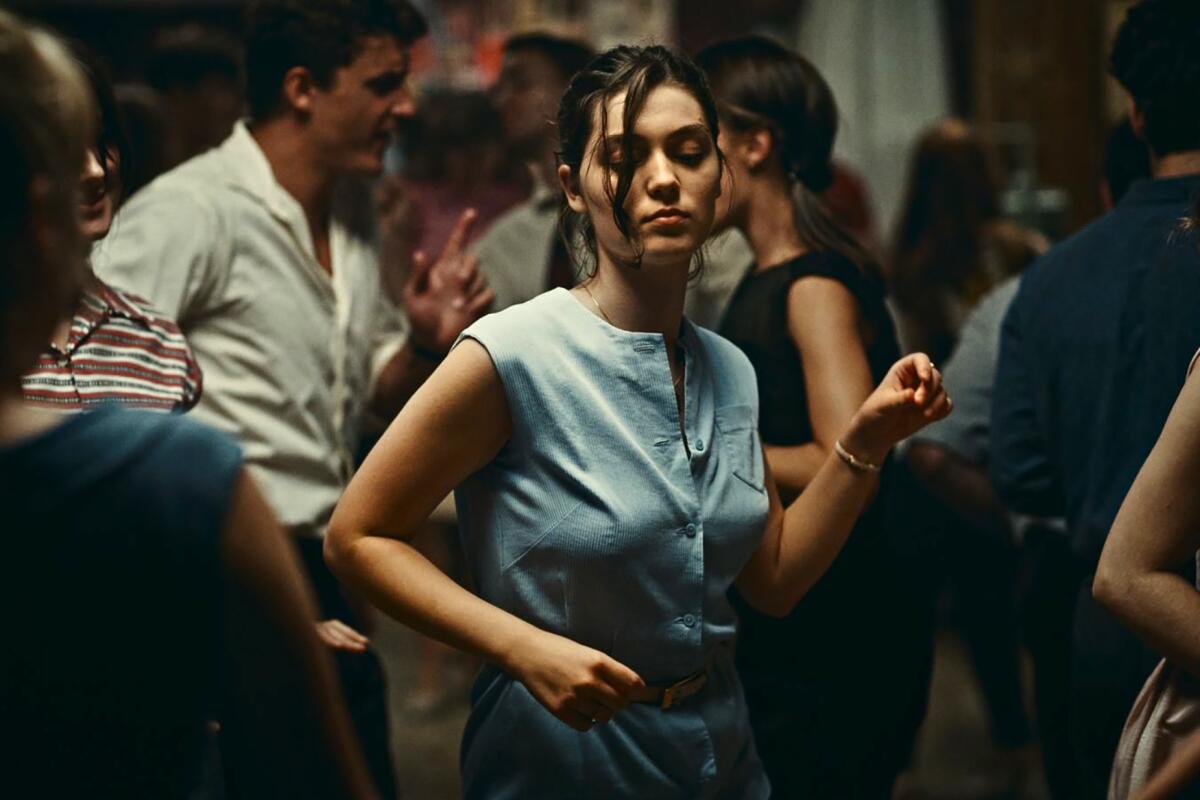
‘Happening’
IFC Films’ timely French abortion drama “Happening,” adapted from Annie Ernaux’s 2000 memoir, follows a university student (Anamaria Vartolomei) dealing with an unwanted pregnancy in 1963 France, when the procedure was still illegal. Written and directed by Audrey Diwan, the film won the Golden Lion at the 2021 Venice Film Festival and was nominated for a British Academy of Film and Television Arts award. It is in limited release this week and will expand nationwide on May 13.
For The Times, Justin Chang wrote, “Diwan, deploying the period details with a subtle hand, immerses us in a vision of the early ’60s that, minus a few plaid skirts and pay phones, might just about pass for the present day. To call this movie timely would be both an understatement and a bit of a misnomer, since the battle for women’s bodily autonomy has never not been a timely issue. It might be more fitting to praise ‘Happening’ for its urgency, not just because it arrives in American theaters under particularly fraught circumstances but also because of the gut-clutching suspense and the wrenching intimacy that the director brings to the telling.”
Mark Olsen spoke to Diwan and Vartolomei and asked the actor what about the script appealed to her. “I think that it’s not only a movie about an illegal abortion, it’s a sort of pursuit of freedom,” Vartolomei said. “And I liked how she portrayed the journey of a woman, the young woman that goes through the discovery of her body, of her sexuality, she feels intellectual desire, sexual desire. She wants to liberate herself socially. It’s not only about illegal abortion. It’s about discovering herself.”
For Rolling Stone, David Fear wrote, “It’s tempting to think some sort of cosmic joke is being played regarding the fact that Diwan’s cri de coeur is being released in America this week, only a few days after a leak of SCOTUS papers confirmed that Roe vs. Wade is a mere whisper away from being overturned. A cosmic joke, or maybe the universe delivering us exactly what we need at this very moment.”
For Tribune News Service, Katie Walsh wrote, “‘Happening’ isn’t a grim cinematic experience. Diwan dares to make this film beautiful, with an exceptionally striking naturalism and grace. The color, especially the blue clothing and architectural details that draw out Vartolomei’s arresting blue eyes, are richly photographed by cinematographer Laurent Tangy.”
For Paste Magazine, Natalia Keogan wrote, “While Diwan may not have intended for her film to possess such a weighted relevance — after all, it’s set in a comparatively ‘dark age’ for French feminism — American viewers will sweat and suffer through this unfortunate, unintentionally forward-looking tableau. Though this fact has been infinitely reiterated during conversations surrounding abortion access, it merits repeating: Banning abortions will never stop people from seeking them out. Individuals will always pursue their right to bodily autonomy, whether or not the state recognizes it as an immutable personal liberty.”
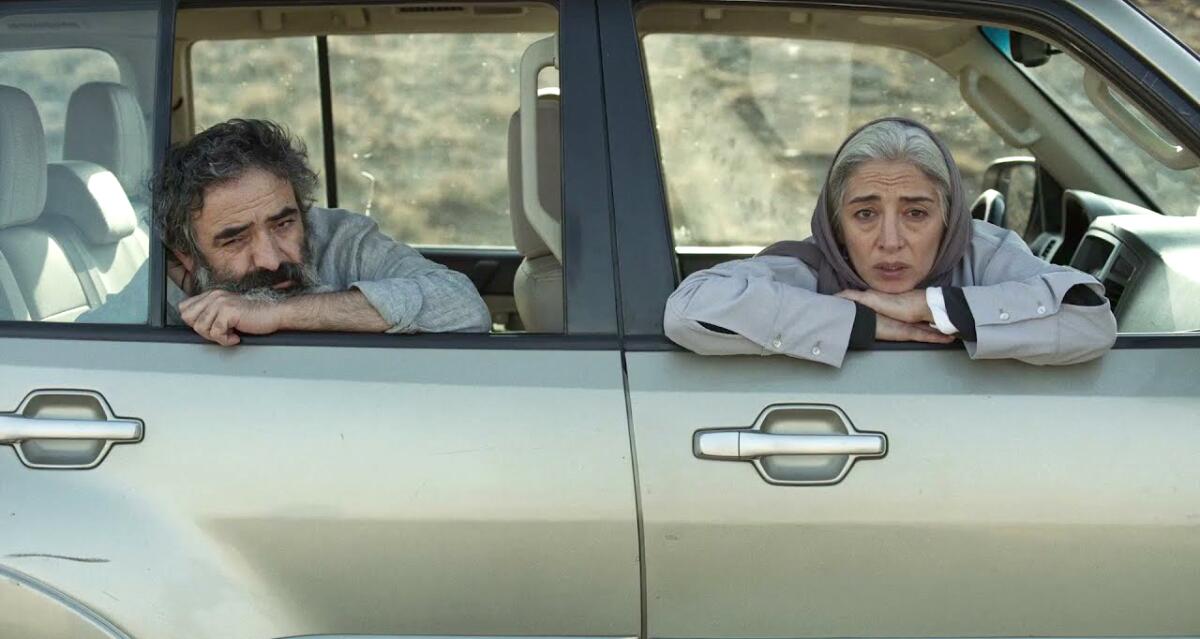
‘Hit the Road’
The feature debut from director Panah Panahi (son of filmmaker Jafar Panahi), “Hit the Road” is an Iranian film about a family of four on a road trip for mysterious reasons. Starring Hassan Madjooni and Pantea Panahiha as the unnamed parents and Amin Simiar and Rayan Sarlak as their sons, the tender road movie is now playing in limited release.
For The Times, Robert Abele called the film “an exquisitely controlled yet diverting blend of pre-mourning and in-the-moment pleasures, a tonal blend of miraculous balance for a first-time filmmaker, even one with Panahi’s one-of-a-kind training. And as the landscape changes from dry, dusty flatness to mist-covered mountain passes, Panahi’s depth-conscious framing of his characters against nature and Amin Jafari’s crisp, dreamlike cinematography shift the atmosphere further, to something almost otherworldly”
For Vulture, Roxana Hadadi wrote, “There is a sparseness to ‘Hit the Road’ that reveals the intuitiveness of Panahi’s filmmaking, his grasp of these characters and how they tug and poke at each other, and his understanding of the ways fear, paranoia, and loss turn us into people we might not like, let alone recognize.”
For Rolling Stone, David Fear wrote, “Part of the joy of ‘Hit the Road’ is submitting semi-blindly to wherever it takes you. The debut film by ... Panahi — son of legendary Iranian director/political martyr Jafar Panahi, a man so determined to make movies despite a government ban that he shot a feature under house arrest and smuggled the result out in a birthday cake — displays an almost perverse sense of pride in doling information in drips, snippets, superficially casual asides that turn out to be deep with meaning.”
For IndieWire, David Ehrlich wrote, “‘Hit the Road’ is a story about people who have to laugh in order to stop themselves from crying, and Panahi commits to that dynamic with the unwavering dedication of someone who knows that his characters don’t have any other choice.”
For Variety, Jessica Kiang wrote, “With a touch on the pedal so light you don’t even feel the woosh, Panah Panahi … goes instantaneously from zero to 60 with his debut feature, ‘Hit the Road.’ Doubly surprising, he does it repeatedly within the film too, from scene to scene — and within scenes, from moment to moment — accelerating and decelerating so abruptly, switching moods like gears, like radio stations, that by the end we should be rattling around inside, carsick, dying to get out. Instead, its 93 minutes whip by so airily, it’s possible not to realize how much you’ve learned to love the family whose road trip you’ve shared in, until the credits roll and you immediately start to miss them.”
Only good movies
Get the Indie Focus newsletter, Mark Olsen's weekly guide to the world of cinema.
You may occasionally receive promotional content from the Los Angeles Times.

